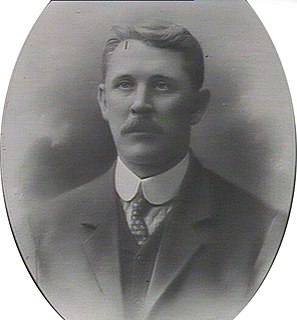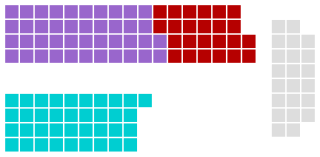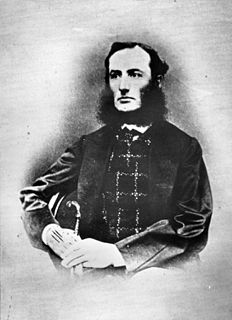Related Research Articles

Sydney Smith was an Australian politician. He began his parliamentary career in the New South Wales Legislative Assembly and served as a government minister under Henry Parkes. He transferred to the new House of Representatives after Federation, representing the Division of Macquarie from 1901 to 1906. He served as Postmaster-General in the Reid Government from 1904 to 1905.

Bourke was an electoral district of the Legislative Assembly in the Australian state of New South Wales from 1880 to 1904, including the towns of Bourke and Cobar. It elected two members simultaneously between 1882 and 1889 increasing to three members until 1894, with each elector being able to vote for as many candidates as there were vacancies.
Hastings was an electoral district of the Legislative Assembly in the Australian state of New South Wales from 1859 to 1880. It was abolished in 1880 as part of the first major redistribution since 1858, replaced by Hastings and Manning from 1880 to 1894, which elected two members with voters casting two votes and the two leading candidates being elected. In 1894 it was divided between the single-member electoral district of Hastings and Macleay and Manning. In 1920 proportional representation was introduced and Hastings and Macleay was absorbed into the new four-member district of Oxley. The electorate was named after the Hastings, the alluvial valleys of which contained most of its population.
Hastings and Macleay was an electoral district of the Legislative Assembly in the Australian state of New South Wales from 1894 to 1920. It was created with the division of the two-member electorate of Hastings and Manning. In 1920 proportional representation was introduced and Hastings and Macleay was absorbed into the new four-member district of Oxley. The electorate was named after the Hastings and Macleay Rivers, the alluvial valleys of which contained most of its population.
New England and Macleay was an electoral district of the Legislative Assembly in the Australian state of New South Wales from 1856 to 1859, in the Northern Tablelands region of New England and part of the Mid North Coast region, including the area to the north of the Macleay River. but excluding the area south of the Macleay River which was included in the Counties of Gloucester and Macquarie. To the north was the electorate of Clarence and Darling Downs and to the west the electorate of Liverpool Plains and Gwydir. It elected two members, with voters casting two votes and the first two candidates being elected. It was partly replaced by New England.

Francis Clarke was an Australian politician.

James Henry Young was an Australian colonial businessman and politician and Speaker of the New South Wales Legislative Assembly.
Thomas George Rusden was a squatter and politician in colonial New South Wales. He was a member of the Legislative Council between 1855 and 1856 and a member of the Legislative Assembly for one term between 1856 and 1857.

James Ashton was an Australian politician.

The 1901 New South Wales state election was held on 3 July 1901 for all of the 125 seats in the 19th New South Wales Legislative Assembly and it was conducted in single-member constituencies with a first past the post voting system. The Parliamentary Electorates Act of 1893 had conferred the right to vote on every male British subject over 21 years of age who was resident in New South Wales for a year or more. The 19th parliament of New South Wales was dissolved on 11 June 1901 by the Governor, Lord Beauchamp, on the advice of the Premier, John See.
Otho Orde Dangar was an Australian politician.

Abram Orpen Moriarty was an Irish-born Australian politician.
The 1904 New South Wales state election involved 90 electoral districts returning one member each. The election was conducted on the basis of a simple majority or first-past-the-post voting system. There were two significant changes from the 1901 election, the first was that women were given the right to vote, which saw an increase in the number of enrolled voters from 345,500 in 1901, to 689,490 in 1904. The second was that as a result of the 1903 New South Wales referendum, the number of members of the Legislative Assembly was reduced from 125 to 90. The combined effect of the changes meant that the average number of enrolled voters per electorate went from 2,764, to 7,661, an increase of 277%. Leichhardt was the only district that was not substantially changed, while The Macquarie and The Murray districts retained nothing but the name.
The 1901 New South Wales state election was for 125 electoral districts, with each district returning one member. The election was conducted on the basis of a simple majority or first-past-the-post voting system. In this election, in 32 electorates the winning candidate received less than 50% of the votes, while 13 were uncontested. The average number of enrolled voters per electorate was 2,764, ranging from Wentworth (1,706) to Willoughby (4,854).
A by-election was held for the New South Wales Legislative Assembly electorate of East Sydney on 23 January 1883 because John McElhone had also been elected to Upper Hunter and chose to resign from East Sydney.
The Hastings, an electoral district of the Legislative Assembly in the Australian state of New South Wales was created in 1859 and abolished in 1880.
A by-election was held for the New South Wales Legislative Assembly electorate of The Hastings on 4 July 1870 as a result of the Legislative Assembly declaring the election of Horace Dean was void. Dean had been appointed the postmaster at Tinonee at the time of the nominations for the 1869 election and resigned the following day. The Committee of Elections and Qualifications held that because he had an office of profit under the crown at the time of his nomination meant he was incapable of being elected, or of sitting, or voting, as a member of the Assembly.
In October 1870 the Committee of Elections and Qualifications conducted a re-count of the 1870 The Hastings by-election, in which Horace Dean had been declared elected over Robert Smith. The Committee declared that Horace Dean was not qualified to be a member and that Robert Smith had been elected.
The Hastings and The Macleay, an electoral district of the Legislative Assembly in the Australian state of New South Wales was created in 1894 and abolished in 1920.
A by-election was held for the New South Wales Legislative Assembly electorate of Hastings and Macleay on 1 March 1900 because Edmund Barton (Protectionist) resigned to travel to London with Alfred Deakin and Charles Kingston to explain the federation bill to the British Government. Francis Clarke was the former member who had resigned in 1898 to allow Barton to re-enter parliament.
References
- 1 2 Green, Antony. "1898 Hastings and Macleay by-election". New South Wales Election Results 1856-2007. Parliament of New South Wales . Retrieved 25 September 2020.
- 1 2 "Mr Francis Clarke (1857-1939)". Former Members of the Parliament of New South Wales . Retrieved 25 September 2020.
- ↑ Green, Antony. "1898 Sydney-King". New South Wales Election Results 1856-2007. Parliament of New South Wales . Retrieved 25 September 2020.
- ↑ "Writ of election: Hastings and Macleay". New South Wales Government Gazette . No. 791. 8 September 1898. p. 7197. Retrieved 25 September 2020– via Trove.
- ↑ "Royal Commission of Inquiry into certain allegations concerning the conduct of the Honourable James Henry Young, Secretary for Public Works, during the recent Election for the Hastings and the Macleay Electorate, and into the circumstances and proceedings". State Records. Government of New South Wales. 15 December 1898. Retrieved 4 July 2021.
- ↑ "The Hastings-Macleay election". The Sydney Morning Herald . 15 December 1898. p. 7. Retrieved 5 July 2021– via Trove.